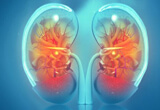




Nephrology is kidney medicine and is a subspecialty of internal medicine. It is concerned with the diagnoses, treatment and management of kidney functions and renal (kidney) replacement therapy, such as dialysis and kidney transplantation.
Nephrologists treat systemic conditions affecting kidneys, such as diabetes and autoimmune disease, as well as hypertension (high blood pressure) and electrolyte disturbances.
The kidneys’ critical functions are to cleanse blood, maintain a stable balance of salt and minerals, and help regulate blood pressure. This is done through the filtering and removal of waste products and excess fluid through the urine.
Specifically, the kidneys do the following:
- Remove waste products and drugs from the body
- Regulate the body’s salt, potassium and acid content
- Release hormones that regulate blood pressure
- Produce hormones that promote strong, healthy bones
- Control the production of red blood cells
Chronic Renal Disease
Chronic Renal Disease is another name for it. Symptoms include feeling generally sick and losing appetite over a period of months or years. When people with high blood pressure, diabetes, or a bloodline related with CKD are tested, they may be discovered to be infected. A creatinine blood test can be used to diagnose CKD (a breakdown product of muscle metabolism). The greater the creatinine levels, the lower the glomerular filtration rate, and as a result, the kidney's ability to filter waste materials decreases. According to international standards, this condition is divided into five stages depending on glomerular filtration rate and urine protein level. Screening is necessary
The following are the most important symptoms:
Increased blood pressure as a result of a fluid overload.
Urea build-up in the urine.
Hyperkalemia occurs when potassium builds up in the blood.
Anemia is caused by a reduction in erythropoietin production.
Fluid overload symptoms can range from moderate edoema to pulmonary edoema.
Acute Kidney Failure
The kidneys' job is to filter bodily fluids, particularly blood. Acute Kidney Failure occurs when the kidney's ability to function is suddenly lost. During this time, the body's fluid levels may reach dangerously high levels. It might happen in a matter of hours or days. It is particularly common in persons who have already been admitted to the hospital and require severe care.
The following are the most important symptoms:
Urine output is reduced, though it may be normal at times.
Swelling of the legs, ankles, or feet as a result of fluid retention.
Nausea, drowsiness, weariness, and shortness of breath
Pain or pressure in the chest.
It can cause a coma or convulsions in certain people.
This failing can also be noticed in someone who feels dizzy.
Anemia kidney Diseases
When the levels of EPO (erythropoietin), a hormone produced by healthy kidneys, fall, anaemia develops. EPO signals the bone marrow to produce red blood cells, which transport oxygen throughout the body via the blood.
The following are the most common symptoms:You appear pale.
You're exhausted.
You have a poor appetite and get little sleep.
You don't have enough energy to complete your daily tasks.
Increased heart rate.
You have shortness of breath or are depressed.
If you are diabetic, you are more likely to experience it. This disease is most prevalent in African-American/Black people.
Diabetic Kidney Diesease
Diabetes causes damage to a person's small blood vessels. The glomeruli, or kidney filters, are damaged. Proteins are released into the urine as a result of the high volume. The body will retain more water and salt than is normally needed. Diabetic Nephropathy is the most common name for this condition. The first sign is elevated albumin levels in the urine. Albumin is the most common protein that leaks from a damaged kidney.
The disease is classified as follows:
Microalbuminuria occurs when the albumin leak is between 30 and 300 mg per day.This is referred to as incipient nephropathy.
Proteinuria occurs when the albumin leak exceeds 300 mg per day.
It is also referred to as macroalbuminuria or overt nephropathia.
Glomerulonephritis
Glomerulonephritis is another name for this condition. The kidneys' glomeruli are tiny filters that remove electrolytes, toxins, and waste from the blood and excrete them through urine. It could be a sudden onset of inflammation or a chronic condition that develops gradually. If this occurs on its own, it is called primary glomerulonephritis; if it occurs in conjunction with diabetes or lupus, it is called secondary glomerulonephritis.
The following are the most common symptoms:
Because of the presence of blood in the stream, the urine is pink or cola coloured.Anemia or kidney failure are both possibilities.
Face, feet, hands, and abdomen swelling Excess protein content causes foamy urine.
Hypertension
Hypertension is a disease of the elderly. In some younger patients hypertension may be secondary to an underlying hormonal imbalance vascular abnormality or kidney disease. Secondary hypertension may be curable. The following suggests that hypertension may be secondary 2 to an underlying problem.
Young age of onset of hypertension
Froth in urine
Nocturia- need to pass urine multiple times in the night
Associated symptoms like severe sweating episodes palpitations, extreme fatigue or weight loss
Ultrasound showing small or unequal kidneys.
With the series of simple to complex tests secondary hypertension can be properly diagnosed and treated to ensure prevention of complications like heart disease, kidney disease and eye damage.
We provide a comprehensive care for evaluation and treatment of hypertension.
Meet Our Doctors







